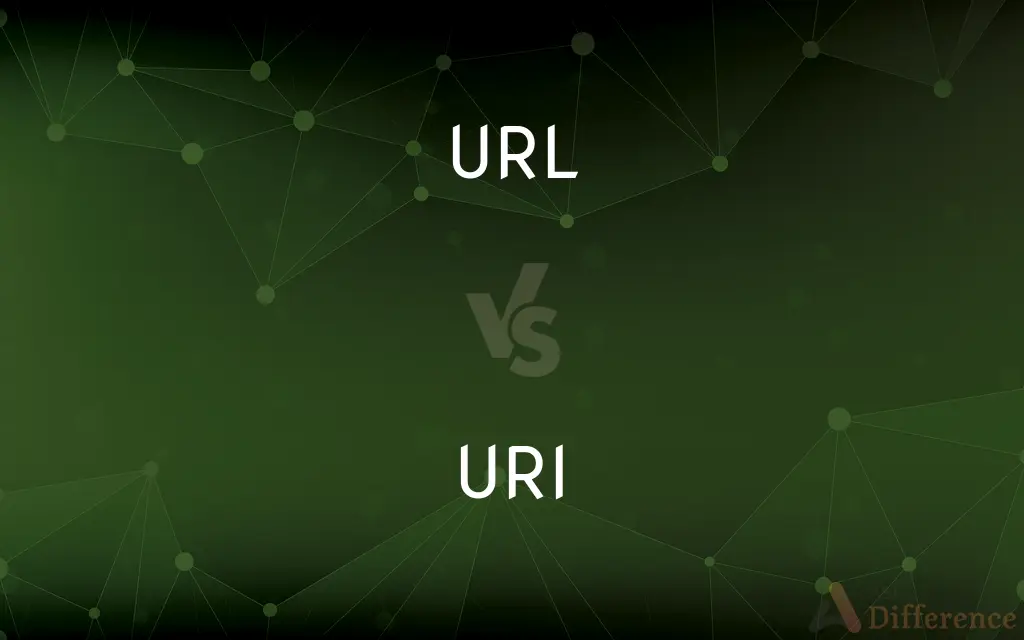URL vs. URI — What's the Difference?
By Tayyaba Rehman — Published on January 4, 2024
A URL is a specific type of URI that not only identifies a resource but also provides a means to locate it. URI is a broader term that includes URLs and URNs.

Difference Between URL and URI
Table of Contents
ADVERTISEMENT
Key Differences
A URL (Uniform Resource Locator) specifies the location of a resource on the internet and the protocol to retrieve it, often used in web browsers. It includes protocol, hostname, and path. A URI (Uniform Resource Identifier) is a more generic term that refers to any type of identifier for a resource, including URLs and URNs (Uniform Resource Names).
Every URL is a URI, but not all URIs are URLs. A URL is a practical application of a URI, focusing on the address of a resource. Whereas, a URI includes identifiers like URLs, which locate resources, and URNs, which uniquely identify resources without providing location information.
Syntax plays a crucial role in differentiating the two. URLs contain information about accessing the resource, such as the scheme (http, ftp), the domain, and the path. On the other hand, URI's syntax is broader and does not necessarily convey access information.
When considering accessibility, a URL is actionable - you can input it into a web browser and be directed to a web page. A URI might not lead you directly to a resource but is used to distinguish it from other resources with a unique identifier.
In terms of usage, URLs are what most people use daily to visit web pages and access files on the internet. URIs encompass URLs and are used in more technical or specific scenarios, such as namespaces in XML or RDF resource identification.
ADVERTISEMENT
Comparison Chart
Definition
A locator for a resource on the web
A broader identifier for any type of resource
Components
Must contain a scheme, host, and path
Can be just a name or locator or both
Accessibility
Directly accessible in a web browser
May not be directly accessible
Usage
Common in daily internet navigation
Used in technical contexts beyond web browsing
Examples
Http://www.example.com/index.html
Urn:isbn:0451450523, http://www.example.com
Compare with Definitions
URL
Often contains a domain name followed by a path to a specific file or page.
You can access the login page directly using the URL http://www.example.com/login.
URI
A generic term for identifying a resource either by location, name, or both.
The string http://www.example.com is a URI that is also a URL.
URL
Includes a protocol scheme, such as HTTP or FTP, for accessing the resource.
The URL ftp://files.example.com starts with an FTP scheme.
URI
Can be a URL, which is actionable, or a URN, which is a persistent identifier.
Use the URI mailto:[email protected] to identify the email address without accessing it.
URL
May contain query parameters for sending data to the server.
Find search results at the URL http://www.example.com/search?q=openai.
URI
It does not necessarily provide a direct method to access the resource.
The URI urn:isbn:0451450523 identifies a book by its ISBN.
URL
A web address specifying the location of a resource on the internet.
Visit our website at the URL http://www.example.com.
URI
Serves as a standard for resource identification across the web.
XML namespaces use URIs like http://www.w3.org/2001/XMLSchema to uniquely define elements.
URL
Can include a port number to specify a particular service endpoint.
Our application is hosted at the URL http://www.example.com:8080/app.
URI
Is protocol-agnostic, as it can refer to resources without specifying a scheme.
The URI urn:uuid:123e4567-e89b-12d3-a456-426614174000 is a URN, not a URL.
URL
An internet address (for example, http://www.hmhco.com/about-hmh), usually consisting of the access protocol (http), the domain name (hmhco.com), and optionally the path to a file or resource residing on the server where the domain name resides (about-hmh).
URI
Plural of urus
URL
The address of a web page on the world wide web
Common Curiosities
Is a URL the same as a URI?
A URL is a type of URI, specifically one that provides a location.
What does URI stand for?
URI stands for Uniform Resource Identifier.
Are URIs case-sensitive?
Yes, they are case-sensitive, but the scheme and host components in a URI are case-insensitive.
What is an example of a URI that is not a URL?
urn:isbn:0451450523 is an example of a URI that is not a URL.
Can a URL contain a fragment identifier?
Yes, such as http://www.example.com/index.html#section2.
Do all URIs have to start with "http"?
No, URIs can use various schemes including "mailto", "ftp", "data", etc.
Can a URI change over time?
While URNs are designed to be persistent, URIs in general can change.
Can a single resource have both a URL and a URN?
Yes, a resource can be identified by both its location (URL) and its name (URN).
Are URLs case-sensitive?
The domain part is not, but the path often is.
What does URL stand for?
URL stands for Uniform Resource Locator.
Is "https" a different scheme than "http"?
Yes, "https" indicates that the connection should be encrypted.
What is an example of a URL?
https://www.openai.com is an example of a URL.
What's the purpose of a URI scheme?
It specifies how the resource should be accessed.
How important is the syntax in a URL?
Extremely important, as incorrect syntax can lead to a failed resource retrieval.
What is the role of a port in a URL?
It specifies the technical gate used to access the resource on the server.
Share Your Discovery

Previous Comparison
Virus vs. Worms
Next Comparison
Virtual Memory in OS vs. Cache Memory in OSAuthor Spotlight
Written by
Tayyaba RehmanTayyaba Rehman is a distinguished writer, currently serving as a primary contributor to askdifference.com. As a researcher in semantics and etymology, Tayyaba's passion for the complexity of languages and their distinctions has found a perfect home on the platform. Tayyaba delves into the intricacies of language, distinguishing between commonly confused words and phrases, thereby providing clarity for readers worldwide.













































